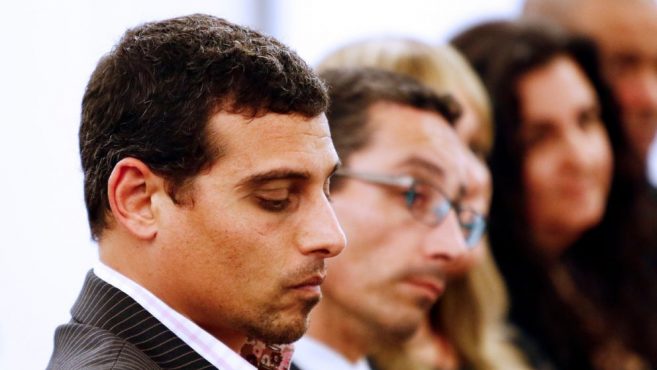Uniting to heal wounds of abuse
The Australian Jewish News
Rebecca Davis
30 March 2017
 Manny Waks (left) and Anton Block at the Night of Healing (photo: Peter Haskin).
Manny Waks (left) and Anton Block at the Night of Healing (photo: Peter Haskin).
IN the wake of last week’s Royal Commission hearing, members of the community gathered with lay and spiritual leaders at Caulfield Park Pavilion for what was billed as “a Night of Healing”.
The event, hosted by advocacy group Tzedek, was the first time that the communal leadership has come together in a public display of unity to acknowledge and apologise for historic incidents of child sexual abuse.
The packed room listened eagerly to each of the speakers, including victim and advocate Manny Waks, Dr Vicki Gordon of Australian Jewish Psychologists, Tzedek CEO Dr Michelle Meyer, Executive Council of Australian Jewry president Anton Block, Rabbinic Council of Australia and New Zealand president Rabbi Yaakov Glasman and president of the Rabbinical Council of Victoria Rabbi Daniel Rabin.
Dr Gordon discussed the impact of abuse on the victim, exploring the term, “soul murder”, as coined by pre-eminent psychoanalyst, Dr Leonard Shengold.
“This assault, this betrayal, often by someone known and trusted by the victim, destroys their soul. It is an assault on their identity as a person. A betrayal like no other, leaving indelible trauma for years, decades, and sometimes a lifetime,” she said, adding, “Our Holocaust culture has taught us about the power of witnessing.
“For trauma victims to begin to heal, we must acknowledge their pain, allow them to talk about it … To witness, and validate … To begin to restore that soul,” she concluded.
Waks noted the success of the community in uniting when external forces lead to “tragedies affecting members … threats of anti-Semitism or the unfair targeting of Israel”.
But he said this solidarity is the antithesis of what was experienced when the community was confronted by the abuse scandal.
“It has often involved members of our community committing unspeakable crimes against other members of our community, powerful community leaders covering up and, or, enabling these crimes, and well known Jewish institutions which had been a source of pride … being shown to have failed miserably in their responsibilities to protect Jewish children.”
Acknowledging funding for the Community Security Group was “a necessary and worthy expense,” he asked, “How do we justify the discrepancy between the funding directed towards external threats, versus the funding directed to internal threats, which have caused so much damage?”
Noting that within broader society “one in five children experience some form of child sexual abuse”, Waks said the scourge “has been and remains the single greatest threat to the lives of members of our community today”.
He concluded with a message directed to fellow victims and survivors: “It was not your fault. You did absolutely nothing wrong.”
The affirmation of absolving victims from any sense of wrongdoing and working towards healing was further advocated by Dr Meyer. “We will never be silent again,” she pledged.
“Breaking the silence is pikuach nefesh (saving a life) and that is a cultural value that should drive us into the future.”
Musing on our collective “failure to protect the most vulnerable” and rebuking “those in our community who have shunned those children and their families when they have come forward”, Block affirmed that “to shun is to be complicit in the abuse that has been perpetuated on the innocent victim”.
He went on to recount how he sat in devastation and disbelief at the Royal Commission.
“How in a modern and enlightened society can the leadership of the Jewish community find itself being asked whether there is any situation where shunning is okay, whether there is any ambiguity? How?” he posed.
Rabbi Glasman stated that “The failure of the rabbis, collectively, or individually is a greater failure than any other communal leader,” adding “The rabbis, more than anyone else, need to take stock … and to understand the hurt that has been caused through their actions … and inactions.”
Rabbi Rabin concurred. Looking out across the audience, before his gaze rested directly with Waks, he admitted, “We failed in our role. And for that we must say sorry, and we are saying sorry … We didn’t react and respond appropriately. We didn’t react and respond in a timely fashion, and therefore to the victims and survivors, we say sorry. I say sorry. I apologise, because as a rabbi, we all bear that responsibility.”
While apologies are an important step on the road to healing, Rabbi Rabin conceded that “it is not enough”. The litmus test will be “our behaviour and responses going forward”, he added.
“That will be an indication if our request for an apology should be accepted.”
He went on to underscore “the unequivocal position that reporting allegations of child sexual abuse is not only permitted in Jewish law, it is in fact, an obligation”, before concluding with an impassioned warning: “If anyone is being shunned in the community for coming forward or who will come forward in the future, know that it is prohibited, and know that we will not allow you. We will stop you. We will prevent you. And we will make sure that it is known that you tried to shun and harm a victim.”
The evening concluded with a musical performance by abuse survivor Rae Le Fleur.
For support or guidance in relation to child sexual abuse, contact Tzedek on 1300 893 335.
Originally published at The Australian Jewish News.